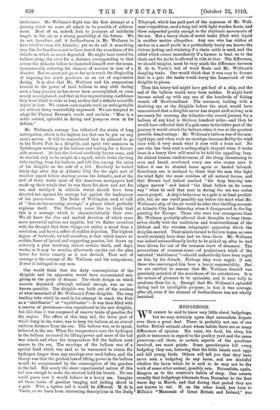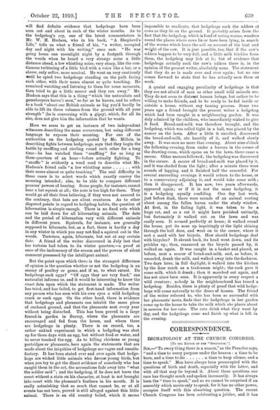HEDGEHOGS.
cannot be said to know very little about hedgehogs, but we may certainly agree that naturalists dispute over them a great deal. There is probably not one of our lowlier British animals about whose habits there are so many differences of opinion. His voice, his food, his sleep, his guilt or innocence in regard to the poultry yard and the game preserves,—all these, or certain aspects of the questions involved, are moot points. Some gamekeepers kill every, hedgehog they can, believing that the little beasts suck eggs and kill young birds. Others will tell you that they have never seen a hedgehog do any harm, and are doubtful whether the harm which he is said to do may not be the work of some other animal, possibly rats. Naturalists, again, disagree as to the creature's habits of sleep. One asserts roundly that hedgehogs hibernate from December to the first warm day in March, and that during that period they are not known to eat. If, on the other hand, you turn to Millais's a Mammals of Great Britain and Ireland," You will find definite evidence that hedgehogs have been seen out and about in each of the winter months. As to the hedgehog's cry, one of the latest commentators is Mr. W. H. Hudson, who in his book, "A Shepherd's Life," tells us what a friend of his, "a writer, occupied day and night with his writing," once saw. " He was going home one moonlight night by a footpath through the woods when he heard a very strange noise a little distance ahead, a low whistling noise, very sharp, like the con- tinuous twittering of a little bird with a voice like a bat, or a shrew, only softer, more musical. He went on very cautiously until be spied two hedgehogs standing on the path facing each other, with their noses almost or quite touching. He remained watching and listening to them for some moments, then tried to go a little nearer and they ran away." Mr. Hudson says that this is a thing " which the naturalists and gamekeepers haven't seen," so far as he knows, and he refers to a book "about our British animals so big you'd hardly be able to lift its three volumes from the ground with all your strength " he is conversing with a gipsy), which, for all its size, does not give him the information that he wants.
Here we seem to get an instance of two independent witnesses describing the same occurrence, but using different language to express their meaning. For one of the authorities on the hedgehog quoted by Mr. Millais, in describing fights between hedgehogs, says that they begin the battle by snuffling and circling round each other for a long time—he has watched them "snuffling" for as long as three-quarters of an hour—before actually fighting. To " snuffle " is evidently a word used to describe what Mr.
Hudson's friend calls "a low whistling noise with their noses almost or quite touching." The real difficulty in these cases is to select words which exactly convey the meaning intended ; also, to be able to compare different persons' powers of hearing. Some people, for instance, cannot hear a bat squeak at all; the note is too high for them. They would go all their lives believing, if they were not assured to the contrary, that bats are silent creatures. As to other disputed points in regard to hedgehog habits, the question of hibernation is simple enough. There is no fixed rale which can be laid down for all hibernating animals. The date and the period of hibernation vary with different animals in different years. Squirrels, for instance, are generally supposed to hibernate, but, as a fact, there is hardly a day in any winter in which you may not find a squirrel out in the woods. Tortoises, again, hibernate, but not at any certain date. A friend of the writer discovered in July last that her tortoise had taken to its winter quarters,—a proof at once of the inclemency of the season and the powers of silent comment possessed by the intelligent animal.
But the point upon which there is the strangest difference of opinion is the question whether or not the hedgehog is an enemy of poultry or game, and if so, to what extent. Do hedgehogs suck eggs ? " Of eggs they are very fond," one naturalist informs us, and it would be interesting to know the exact data upon which the statement is made. The writer has tried, and has failed, to get first-hand information from any person who has seen with his own eyes a wild hedgehog crack or suck eggs. On the other hand, there is evidence that hedgehogs and pheasants can inhabit the same piece of enclosed ground, and that the pheasants nest every year without being disturbed. This has been proved in a large fenced-in garden in Surrey, where the pheasants are encouraged and fed from the house, and where there are hedgehogs in plenty. There is on record, too, a rather unkind experiment in which a hedgehog was shut np for three days with an egg, but without food or water, and he never touched the egg. As to killing chickens or young partridges or pheasants, here again the statements that are made about the iniquities of hedgehogs are vague and unsatis- factory. It has been stated over and over again that hedge- hogs are wicked little animals who devour young birds, but when you try to get the direct evidence of somebody who hag caught them in the act, the accusations fade away into " what the soldier said "; and the hedgehog, if he does not leave the court without a stain on his character, at least is not brought into court with the pheasant's feathers in his mouth. It is really astonishing that so much that cannot be, or at all events has not been, proved is still alleged against this little animaL There is an old country belief, which it seems impossible to eradicate, that hedgehogs suck the udders of cows as they lie on the ground. It probably arises from the fact that the hedgehog, which is fond of eating worms, wanders round the places where cows lie or have been lying, in search of the worms which leave the soil on account of the heat and weight of the cow. It is just possible, too, that if the cow's udders happen to be very full, and a little milk trickles from them, the hedgehog may lick at it ; but of evidence that hedgehogs actually suck the cow's udders there is, in the opinion of the present writer, absolutely none. The statement that they do so is made over and over again ; but no one comes forward to state that he has actually seen them at work.
A quaint and engaging peculiarity of hedgehogs is that they are not afraid of man as other small wild animals are. They do not seem to distrust human beings, but rather to be willing to make friends, and to be ready to be fed inside or outside a house, without any taming process. Some two years ago a friend brought the present writer a hedgehog which had been caught in a neighbouring garden. It was duly admired by the children, who immediately wished to give it food. Bread-and-milk was therefore brought, and the hedgehog, which was rolled tight in a ball, was placed by the saucer on the lawn. After a little it unrolled, discovered the bread-and-milk, ate heartily of it, and walked slowly away. It was seen no more that evening. About nine o'clock the following evening, from under a bureau in the corner of the drawing-room, which opens on to the lawn, there came a sneeze. Other sneezes followed; the hedgehog was discovered in the corner. A. saucer of bread-and-milk was placed by it, and it was shaded from the light ; after a minute there were sounds of lapping, and it finished half the saucerful. For several succeeding evenings it would return to the house, or to a conservatory adjoining it, and would take some milk ; then it disappeared. It has now, two years afterwards, appeared again; or if it is not the same hedgehog, it is a hedgehog equally confiding. One day last week, just before dusk, there were sounds of an animal routing about among the fallen leaves under the study window. At first, in the failing light, it was taken to be a huge rat, and as a rat it might have perished untimely, but fortunately it walked out on the lawn and was easily seen. It seemed perfectly at home; it walked round the house, put its nose up inquiringly at the light shining through the hall door, and went on to the corner, where it met a maid with her bicycle. How should hedgehogs deal with bicycles P It shrank back, its head went down, and its prickles up ; then, reassured as the bicycle passed by, it walked on again. It was caught in a basket and placed, as before, next a saucer of bread-and-milk, and, as before, it uncurled, drank the milk, and walked away into the darkness. Two days later, in full daylight, it walked into the kitchen by the door much as a tradesman might; the cook gave it some milk, which it drank ; then it marched out again, and has not since been seen. It is apparently in every respect a wild creature ; nobody in the neighbourhood has tamed a hedgehog. Besides, there is plenty of proof that wild hedge- hogs will come naturally to the doors of houses. The friend of the writer referred to, who has been so successful with her pheasants' nests, finds that the hedgehogs in her garden come up to the house to take the milk which she places about in saucers for her cats. The cats drink what they want by day, and the hedgehogs come and finish up what is left in the evening.















































 Previous page
Previous page